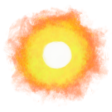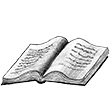Books for thinking and learning
These are books that were important to me at different points in my life, that I go back to read again often.
The Creative Act by Rick Rubin. Probably the best book about the creative process in everyday life and in art, and also the most positive, optimistic book I’ve read.
Braiding Sweetgrass by Robin Wall Kimmerer. Scientific and spiritual wisdom about living in harmony with the natural world.
Bridge of Waves and The Listening Book by W.A. Mathieu. Recommended to anyone remotely interested in sound and music and life itself, reading these books, Bridge of Waves in particular, is like discovering an unexplored and beautiful region of a world you thought you knew.
Meditations by Marcus Aurelius. Timeless advice about life and death from a ruler/philosopher who seemed to have been actually good and uncorrupted by power.
Fingers Pointing to the Moon by Jane English, concerning her experiences as an atomic physicist and artist photographer.
Lao Tsu: Tao Te Ching translated by Gia-Fu Feng and Jane English. Ancient koans about nature and the nature of reality, with a favorite series of black and white nature photographs.
Jonathan Livinston Seagull by Richard Bach and Russell Munson, about the freedom of flight and of thought.
Creativity: A Short and Cheerful Guide by John Cleese. The book version of this talk by Monty Python’s best comedian, about making the time and space for your conscious and subconscious mind to work together.
Think on These Things by Jiddu Krishnamurti. The author was brought up to lead a religion but abolished it instead. Probably the book that had the greatest effect on my life so far.
The Dispossessed by Ursula K. Le Guin, author of the short story The Ones Who Walk Away from Omelas. Even the most idealistic societies have imperfect balances between freedom and equality.
I Am a Strange Loop by Douglas Hofstadter. A more concise discussion of the development of the sense of “I” and the nature of human consiousness discussed in his denser Gödel, Escher, Bach: an Eternal Golden Braid.
Drawing on the Right Side of the Brain by Betty Edwards. Teaches you to draw and gives insight into how your brain works.
Pragmatic Thinking and Learning by Andy Hunt. Tips on knowledge and creativity and process. Written from a software developer’s perspective, but useful to anyone, I feel.
Art is Work and Graphic Design by Milton Glaser. These books were the spark of my professional life and I was lucky to later meet and work with Milton before he passed. See also his essay, Ten Things I Have Learned.
The Medium is the Massage by Marshall McLuhan and Quentin Fiore. It took me a long time to notice that the word in the title is “massage”, and not “message”. An illuminating book about the manipulative nature of media.
The Lord of the Rings by J.R.R. Tolkien. To see reality more clearly, travel through fictional lands and stories. A book about love, war, friendship, and humans’ relationship with nature. Tip for anyone who has trouble with fiction: Skip the prologue.
The Psychopath Code by Peter Hintjens. Most people are kind, but there are troublemakers out there. This book helped me learn to identify, avoid, and work around them.
Debugging Teams by Brian W. Fitzpatrick and Ben Collins-Sussman. A guide on working well with other people and navigating the world of organizations with humility, respect, and trust.
Narcissus and Goldmund by Hermann Hesse. A story about two friends who take different paths in life. The ending stays with me.
Cosmos by Carl Sagan. When the world seems too much I like to go somewhere dark and look at the stars at night, or read this book, a grounding guide to our place in the universe, also available as a television series. Also recommended, his last book The Demon-Haunted World: Science as a Candle in the Dark which includes the “bullshit detection kit”, and The Dragons of Eden: Speculations on the Evolution of Human Intelligence.
The Tale of Peter Rabbit by Beatrix Potter. A book given to me by my dad, it taught me to care for and appreciate animals and nature, and it brings to mind the scents of the old garden in my uncle and aunt’s place in Norfolk. Dad also gave me his copy of A Child’s Garden of Verses by Robert Louis Stevenson.
TO ANY READER
As from the house your mother sees
You playing round the garden trees,
So you may see, if you will look
Through the windows of this book,
Another child, far, far ways,
And in another garden, play.
But do not think you can at all,
By knocking on the window, call
That child to hear you. He intent
Is all on his play-business bent.
He does not hear; he will not look,
Nor yet be lured out of this book.
For, long ago, truth to say,
He has grown up and gone away,
And it is but a child of air
That lingers in the garden there.
(from A Child’s Garden of Verses, The Works of Robert Louis Stevenson, Swanston edn, vol xiv [London: Chatto and Windus, 1911], p. 59.)
You do not have to be good.
You do not have to walk on your knees
for a hundred miles through the desert repenting.
You only have to let the soft animal of your body
love what it loves.
Tell me about despair, yours, and I will tell you mine.
Meanwhile the world goes on.
Meanwhile the sun and the clear pebbles of the rain
are moving across the landscapes,
over the prairies and the deep trees,
the mountains and the rivers.
Meanwhile the wild geese, high in the clean blue air,
are heading home again.
Whoever you are, no matter how lonely,
the world offers itself to your imagination,
calls to you like the wild geese, harsh and exciting—
over and over announcing your place
in the family of things.
By Mary Oliver
· ˖ ✦ . ˳
Come with me in creative journeys through music and play by subscribing to my YouTube and Twitch channels. ❤︎ Did you enjoy this post? You can buy me a moment of time.
Possibly Related:
- Dissolution Speech
- The Creative Act
- Two thousand and twenty-five
- Song stretcher
- Who is (music) theory for?
˳ · ˖
Prior entry: Wrong Moment to Reload
Next entry: Bonk!

